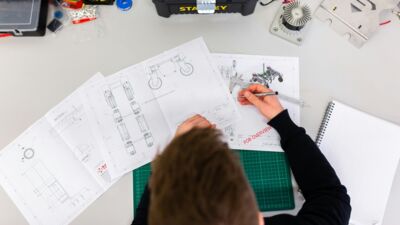Pre-Engineering at Concordia

Engineering is a career field with many niche opportunities found within. Students can truly tailor their career to their interests all while studying the greater field of engineering. They can lean towards electrical engineering and focus on building circuit boards and working with programming. They could also go towards the civil engineering side of designing and constructing buildings and bridges. Or students could choose to work in the space industry and work on designing pressurized tanks for rocket ships.
Whichever way a student chooses to go, Concordia University, Nebraska offers a comprehensive program to prepare graduates to pursue further specialized education. Concordia’s program gives students a solid background in mathematics, the physical sciences and computer science, as well as the humanities and social sciences. This broad foundation of courses prepares students for engineering graduate school and a wide range of specialty areas. Some of these areas include aerospace, agricultural, chemical, civil, electrical, environmental, industrial and mechanical engineering, among others.
After completing the pre-engineering program and earning a bachelor’s degree in a math or science related field at Concordia, graduates will go on to earn their master’s or in some cases doctoral degree in an engineering field. Before they enter the work force, they will also need to obtain state licensure if they intend to offer their services directly to the public. Most of the time graduates need to pass the Fundamentals of Engineering exam and the Principles and Practice of Engineering exam, as well as complete engineering experience in order to obtain licensure.
Some career outcomes within engineering include electrical engineering, working as a testing engineer, working in the space industry, aerospace engineering, web development, civil engineering, chemical engineering and physics.
Electrical engineers do things like build circuit boards, programming and automation. Testing engineers work in mechanical and electrical positions. They design technology intended to test the integrity of tech implements as they are created. Engineers in the space industry do things like make pressurized tanks for rocket ships. Aerospace engineers can work in positions in places like aerodynamics labs.
Other engineers work in web development. They code circuit boards. Web developers also work for internet companies like Google and create software. Civil engineers design and construct things like buildings and bridges. Chemical engineers work in labs and create and test new chemical products. Engineers can also work in physics in positions such as laser and optical engineers.
The average salary for engineers varies greatly based on location, specialization, and experience. The Bureau of Labor Statistics puts the average annual wage for engineers at $118,350. This excludes sales, locomotive and ship engineers.
Despite the field of engineering being extremely varied, Concordia University offers a comprehensive basic program that will give students an incredibly solid foundation and allow them to pursue an engineering career of their choice.
In the Concordia University, Nebraska pre-engineering program, you will be equipped with the technical and creative problem-solving skills from a Christian perspective to help you meet professional expectations so you can help build a safer and more efficient world. Learn more here.
Interested in the pre-engineering program at Concordia University, Nebraska?
Related Stories


